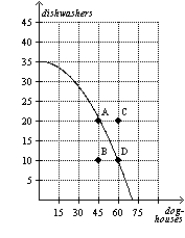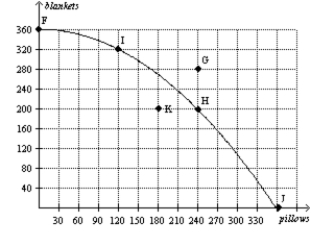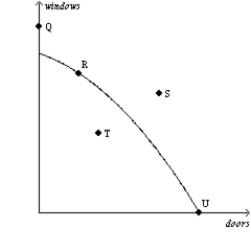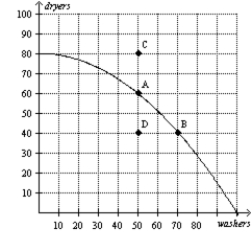A) produce inside its production possibilities frontier.
B) produce on its production possibilities frontier.
C) produce outside its production possibilities frontier.
D) experience an inward shift of its production possibilities frontier.
F) A) and C)
Correct Answer

verified
Correct Answer
verified
True/False
If an economy can produce more of one good without giving up any of another good, then the economy's current production point is inefficient.
B) False
Correct Answer

verified
Correct Answer
verified
True/False
In the circular-flow diagram, firms consume all the goods and services that they produce.
B) False
Correct Answer

verified
Correct Answer
verified
True/False
Use the following Figure to answer the question : Figure 2-23 :  -Refer to Figure 2-23. Points B and C represent infeasible outcomes for this economy.
-Refer to Figure 2-23. Points B and C represent infeasible outcomes for this economy.
B) False
Correct Answer

verified
Correct Answer
verified
Multiple Choice
Which of the following statements is correct?
A) Economists almost always find it easy to conduct experiments in order to test their theories.
B) Economics is not a true science because economists are not usually allowed to conduct experiments to test their theories.
C) Economics is a social science rather than a true science because it cannot employ the scientific method.
D) Economists are usually not able to conduct experiments, so they must rely on natural experiments offered by history.
F) None of the above
Correct Answer

verified
Correct Answer
verified
Multiple Choice
Use the following Figure to answer the question : Figure 2-6  -Refer to Figure 2-6. If this economy moves from point F to point G, then which of the following statements is correct?
-Refer to Figure 2-6. If this economy moves from point F to point G, then which of the following statements is correct?
A) This economy has moved from a point of inefficient production to a point of efficient production.
B) This economy has experienced economic growth.
C) This economy has experienced an increase in employment.
D) None of the above is correct.
F) A) and B)
Correct Answer

verified
Correct Answer
verified
Multiple Choice
Suppose an economy produces two goods, food and machines. This economy always operates on its production possibilities frontier. Last year, it produced 1000 units of food and 47 machines. This year, it is producing 1050 units of food and 52 machines. Which of the following events could not explain the increase in output?
A) a reduction in unemployment
B) an increase in available labor
C) an improvement in technology
D) Any of these events could explain the increase in output.
F) A) and C)
Correct Answer

verified
Correct Answer
verified
Multiple Choice
Economists sometimes give conflicting advice because
A) graduate students in economics are encouraged to argue with each other.
B) economists have different values and scientific judgment.
C) economists acting as scientists do not like to agree with economists acting as policy advisers.
D) economics is more of a belief system than a science.
F) B) and C)
Correct Answer

verified
Correct Answer
verified
Multiple Choice
Which of the following statements is correct?
A) Few economic models incorporate assumptions.
B) Different economic models employ different sets of assumptions.
C) Good economic models attempt to mimic reality as closely as possible.
D) Economic models, to be accepted, must be tested by conducting experiments.
F) A) and C)
Correct Answer

verified
Correct Answer
verified
Multiple Choice
The production possibilities frontier is a graph that shows the various combinations of output that an economy
A) should produce.
B) wants to produce.
C) can produce.
D) demands.
F) A) and D)
Correct Answer

verified
Correct Answer
verified
True/False
Production possibilities frontiers can be used to illustrate scarcity, trade-offs, opportunity cost, efficiency, unemployment, technological advances, and economic growth.
B) False
Correct Answer

verified
Correct Answer
verified
Multiple Choice
In the circular-flow diagram, in the markets for
A) goods and services, households and firms are both sellers.
B) goods and services, households are buyers and firms are sellers.
C) the factors of production, households are buyers and firms are sellers.
D) the factors of production, households and firms are both buyers.
F) A) and C)
Correct Answer

verified
Correct Answer
verified
Multiple Choice
Use the following Figure to answer the question : Figure 2-4 :  -Refer to Figure 2-4. Inefficient production is represented by which points) ?
-Refer to Figure 2-4. Inefficient production is represented by which points) ?
A) Q, S
B) Q, S, T
C) R, U
D) T
F) C) and D)
Correct Answer

verified
Correct Answer
verified
Multiple Choice
The simple circular-flow diagram is a model that includes only some key players in the real economy. Which of the following key players are omitted from the simple circular-flow model?
A) households
B) firms
C) government
D) markets for factors of production
F) B) and C)
Correct Answer

verified
Correct Answer
verified
True/False
There is only one explanation for why economists give conflicting advice on policy issues, and it is that they have different values about what policy should try to accomplish.
B) False
Correct Answer

verified
Correct Answer
verified
Multiple Choice
Use the following Figure to answer the question : Figure 2-5:  -Refer to Figure 2-5. It is possible for this economy to produce
-Refer to Figure 2-5. It is possible for this economy to produce
A) 60 dryers and 50 washers.
B) 60 dryers and 60 washers.
C) 80 dryers and 50 washers.
D) All of the above.
F) All of the above
Correct Answer

verified
Correct Answer
verified
Multiple Choice
One way to characterize the difference between positive statements and normative statements is as follows:
A) Positive statements tend to reflect optimism about the economy and its future, whereas normative statements tend to reflect pessimism about the economy and its future.
B) Positive statements offer descriptions of the way things are, whereas normative statements offer opinions on how things ought to be.
C) Positive statements involve advice on policy matters, whereas normative statements are supported by scientific theory and observation.
D) Economists outside of government tend to make normative statements, whereas government-employed economists tend to make positive statements.
F) B) and C)
Correct Answer

verified
Correct Answer
verified
Multiple Choice
A macroeconomist - as opposed to a microeconomist - would study
A) the effects of rent control on housing in New York City.
B) the effects of foreign competition on the US auto industry.
C) the effects of borrowing by the federal government.
D) the effects of raising the gasoline tax on transit ridership.
F) B) and D)
Correct Answer

verified
Correct Answer
verified
Multiple Choice
President Truman once said he wanted to find a one-armed economist because when he asked his economists for advice, they always answered, "On the one hand, ... On the other hand, ..." Truman's observation that economists' advice is not always straightforward
A) is rooted in the principle that people face tradeoffs.
B) indicates that economists recognize that there are opportunity costs associated with policy decisions.
C) confirms that economists are not suited to be presidential advisers.
D) More than one of the above is correct.
F) A) and B)
Correct Answer

verified
Correct Answer
verified
Multiple Choice
Positive statements are not
A) descriptive.
B) prescriptive.
C) claims about how the world is.
D) made by economists speaking as scientists.
F) A) and D)
Correct Answer

verified
Correct Answer
verified
Showing 241 - 260 of 615
Related Exams